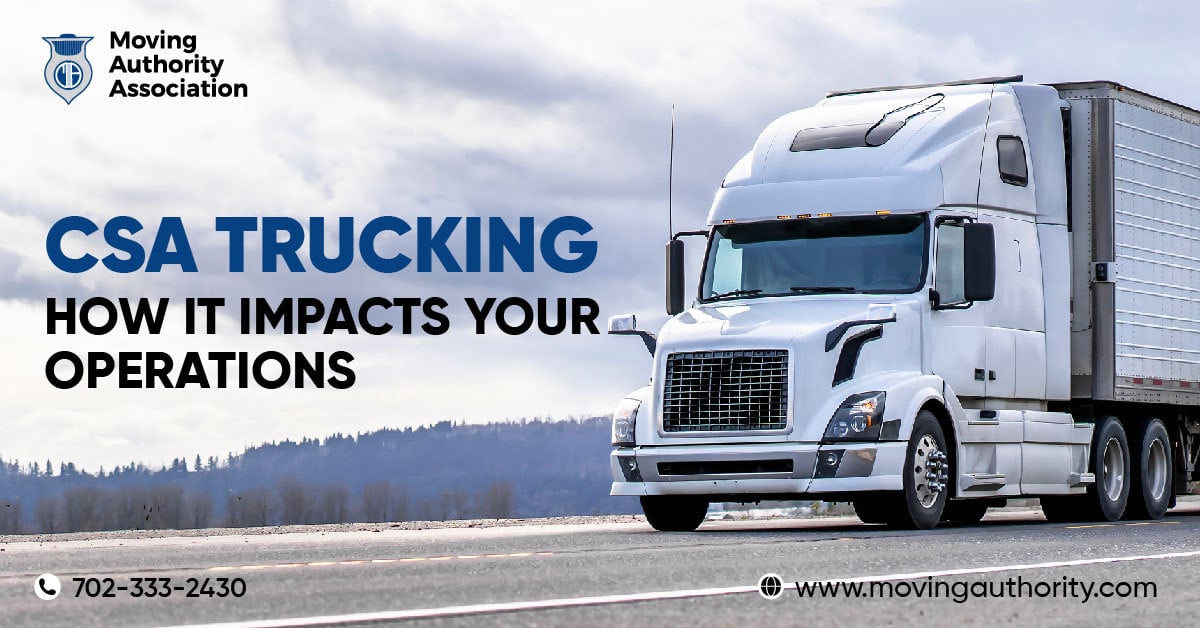
CSA Trucking, How It Impacts Your Operations
As a trucking company, ensuring compliance with federal regulations is a critical component of your operations. One such regulation is the Compliance, Safety, and Accountability (CSA) program, which aims to improve the safety of commercial motor vehicles on U.S. highways. Learn more about Starting a Trucking Company information. Understanding how CSA scores impact your operations can help you prioritize safety and compliance, avoid penalties and fines, and maintain a positive reputation in the industry. In this article, we'll explore the basics of CSA trucking and its impact on your operations. So fasten your seatbelt, and let's get started!
What Exactly Is CSA?
The Compliance, Safety, and Accountability (CSA) program is an initiative of the Federal Motor Carrier Safety Administration (FMCSA) that aims to improve safety in the trucking industry. Do you Want to know the BOC-3 Filing? The program uses data from various sources to identify carriers that pose the greatest safety risks and prioritize interventions to address those risks. CSA is based on seven categories of safety performance known as the BASICs (Behavior Analysis and Safety Improvement Categories).
The seven CSA BASICs include Unsafe Driving, Hours-of-Service Compliance, Driver Fitness, Controlled Substances/Alcohol, Vehicle Maintenance, Hazardous Materials Compliance, and Crash Indicator. Each BASIC represents a different aspect of safety performance, and carriers are scored based on their performance in each category. These scores are then used to calculate the carrier's overall CSA score, which is publicly available on the FMCSA website.
CSA scores range from 0 to 100, with higher scores indicating poorer safety performance. Carriers with high CSA scores are more likely to be targeted for interventions by the FMCSA, such as compliance reviews or onsite investigations. Learn more about Biennial Update. It is important for carriers to understand their CSA scores and take proactive measures to improve their safety performance in order to avoid potential penalties and protect their reputation in the industry.
The Impact Of CSA On Your Operations
The Compliance, Safety, and Accountability (CSA) program is a critical aspect of trucking operations. It assesses carrier safety performance and enforces compliance with federal regulations. Read more about Broker Freight Package. The program uses seven BASICs (Behavior Analysis and Safety Improvement Categories) to evaluate carriers' safety performance and assigns CSA scores based on violations and crashes.
CSA scores have a significant impact on a carrier's operations. They can affect driver hiring and retention, as well as insurance rates. Carriers with high CSA scores may have difficulty attracting and retaining drivers, as drivers may hesitate to work for a company with a poor safety record. Additionally, high CSA scores can result in higher insurance rates, which can increase operational costs and reduce profitability.
FMCSA audits and inspections are also affected by CSA scores. Carriers with high CSA scores may be subject to more frequent and rigorous audits and inspections, which can be time-consuming and disruptive to operations. Do you want to know Broker Mover Package information? Additionally, carriers with high CSA scores may face penalties and fines for non-compliance with federal regulations.
Finally, CSA scores can impact a carrier's reputation. A carrier with a poor safety record may be viewed unfavorably by customers, potentially leading to a loss of business. On the other hand, carriers with strong safety records and low CSA scores may be more attractive to customers and gain a competitive advantage in the industry.
How To Successfully Manage CSA Scores
As a trucking company, it's crucial to understand the importance of managing your CSA scores. To successfully manage your CSA scores, you need to start by identifying areas that require improvement. Once you have identified the areas of deficiency, you can create a plan to address them. Do you want to know CA Number? Some of the most common areas that require improvement include unsafe driving, hours-of-service compliance, vehicle
maintenance, and controlled substances and alcohol.
To maintain good CSA scores, it's essential to train your drivers and staff on best practices. This training can include topics such as defensive driving, cargo securement, and vehicle inspections. In addition to training, you can also use technology to improve safety and compliance. For example, implementing electronic logging devices (ELDs) can help you ensure hours-of-service compliance, while GPS tracking can help you monitor vehicle speed and location.
Regular monitoring and tracking of CSA scores is also critical. Monitoring your scores can help you identify trends and areas that require improvement. Know what is Carrier Agreement. There are several resources available to help you manage your CSA scores, including the FMCSA's Safety Measurement System (SMS), which provides real-time data on carrier safety performance. Other resources include safety consultants, industry associations, and training programs.
By implementing these strategies, you can successfully manage your CSA scores and maintain compliance with FMCSA regulations. Read more about the Claims Package. Remember, a good CSA score is essential for your business's success, so it's important to prioritize safety and compliance in all your operations.
Wrapping Up
As we wrap up this article on CSA trucking and its impact on operations, it's important to understand the significant role that CSA plays in the trucking industry. Learn more about DOT Number Deactivation With its emphasis on safety and compliance, CSA scores can have a profound impact on a company's reputation, insurance rates, and ability to secure business.
To successfully manage CSA scores, trucking companies must take a proactive approach to safety management, regularly monitoring and tracking their scores and addressing any deficiencies promptly. Do you want to know Dot Authority? They must also ensure that their drivers and staff are well-trained and equipped with the necessary tools and technologies to maintain compliance with FMCSA regulations.
Staying compliant with trucking regulations and maintaining high CSA scores is not only the law, but it also ensures the safety of everyone on the road. As such, trucking companies must prioritize safety and compliance and take the necessary steps to manage their CSA scores effectively.





